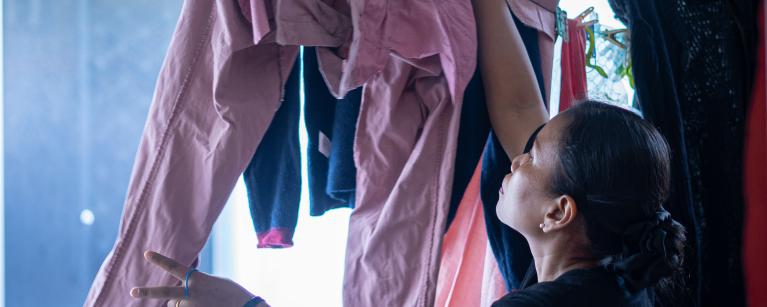Oxfam launched and disseminated the key findings of its “Household Care Survey Pilot in Cambodia” on 25 February 2025 in Phnom Penh. The major key finding is that women spend on average 5 hours and 2 minutes on Unpaid Care and Domestic Work (UCDW) daily, in contrast to 2 hours and 6 minutes for men, highlighting that gender disparity starts at home.
The survey and analysis were conducted by Analytics and Insights Asia (AI-Asia) from August to November 2024, in close consultation with Oxfam and the Ministry of Women’s Affairs. The survey team interviewed more than 1,100 Cambodians, including women, men, girls, and boys from 447 households in Prey Veng, Siem Reap, Mondulkiri, and Kampot. Respondents reported in detail how they use their daily time, the various impacts UCDW may have on them, their feelings and perceptions about UCDW, their access to essential infrastructures and services, and their support needs.
This Household Care Survey pilot produced a wealth of data and information that can help stakeholders better understand time-use patterns across genders, ages, income levels, and geographic locations, to identify potential factors that influence the distribution of roles within families, and to develop initiatives, programs, or policies that are gender-transformative and address the root causes of gender inequality in UCDW. This survey is part of the initiative funded by the Embassy of Ireland.
Ms. Sophoan Phean, National Director of Oxfam, said, “The heavy responsibilities to care for their families and homes are unfairly imposed on women and girls by gendered societal expectations. A healthy, loving, and harmonious home is essential for family members to go to work and to school in the best conditions. But it is everyone’s responsibility, not just women and girls.”
Ms. Deirdre Ní Fhallúin, Ambassador of Ireland to Cambodia, echoed the need to address the imbalance in unpaid care responsibilities.
“"Ireland strongly values the role of women in economic development. We believe that recognizing, reducing, and redistributing unpaid care work is essential for empowering women and ensuring their full participation in economic and social life"”
Cambodia has recognized very early the essential value of care and domestic work in Article 36 of the Constitution, which states that “Housework shall have the same value as remunerated work outside the home.” This is a very progressive stance that Cambodia has embedded in the highest law of the country. However, while women and girls spend an excessive amount of time to take care of their homes and families, they do so at the cost of their own personal care, education, development, and professional careers.
To develop policies and initiatives that support the reduction, redistribution, and rewarding of women’s and girls’ unpaid care and domestic work responsibilities, updated sex-disaggregated data and statistics on time spent on UCDW, distribution of roles, and support needs are crucially required for gender-responsive and transformative interventions. In Cambodia, the last national care-related time-use data were collected in 2004, when it was found that women spent 188 minutes (3 hours and 8 minutes) daily on UCDW and men spent just 18 minutes.
Based on Oxfam’s Household Care Survey Pilot, the time spent by women increased, but the gap between women and men significantly narrowed as well. However, it must be noted that the methodologies used in both cases had several important differences, including the sampling sizes, the method of recording time use, and the frequency of time recording. Although recent anecdotal evidence points to a shrinking gap, international multilateral organizations still present Cambodia’s official 2004 time use statistics. This is why it is imperative for Cambodia to include care-related time-use instruments in its national household surveys to reflect current realities and to provide data to support public policies that advance gender equality.
